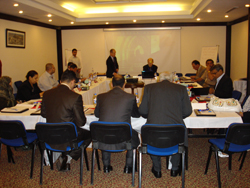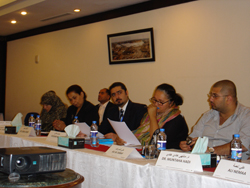USIP’s Center of Innovation for Media, Conflict and Peacebuilding organized an expert working group on April 26-27 in Erbil, Iraq to discuss how to create a multimedia program that will provide Iraqi teenagers the tools to help them grow into independent, empowered citizens within a complex society. USIP brought together 25 experts for the working group, consisting of educators, media, youth NGO representatives, government officials and USIP-trained conflict resolution facilitators.
 USIP’s Center of Innovation for Media, Conflict and Peacebuilding organized an expert working group on April 26-27 in Erbil, Iraq to discuss how to create a multimedia program that will provide Iraqi teenagers the tools to help them grow into independent, empowered citizens within a complex society.
USIP’s Center of Innovation for Media, Conflict and Peacebuilding organized an expert working group on April 26-27 in Erbil, Iraq to discuss how to create a multimedia program that will provide Iraqi teenagers the tools to help them grow into independent, empowered citizens within a complex society.
USIP brought together 25 experts for the working group, consisting of educators, media, youth NGO representatives, government officials and USIP-trained conflict resolution facilitators. Brett Pierce, a Sesame Workshop producer and youth media expert, moderated the two-day discussion.
"The gathering represented a mix of passionate and determined Iraqi decision-makers who, in the end, fully embraced the notion that the youth need to have their own voice in this emerging society. It was an intense and condensed journey for many," Pierce said.
On the first day, the working group primarily focused on coming up with a proposed goal for the multimedia program.
The resulting goal for the program was: "to empower Iraqi youth to be confident and constructive participants in society by showcasing their voices and capacities in ways that foster the continued evolution of a peaceful nation."
The Iraqi participants were asked to comment on how relevant this goal was to Iraqi life and what, if any, changes were needed.
They were also asked to consider how the following elements related to the media program’s overall objective:
- Creating awareness of the value of self-confidence and the means to achieve it;
- Building an understanding that we are all vital members of a variety of communities -- local, national and global — and that constructive participation in those communities is needed, desired and rewarding;
- Creating awareness of the rights and responsibilities of citizenship in Iraq and the value of exercising those rights and responsibilities;
- Fostering open-mindedness through the cultivation of an appreciation of the diverse voices that make up Iraqi society.
 The working group agreed on the importance of these elements and the critical role young Iraqis play in developing the content of the program.
The working group agreed on the importance of these elements and the critical role young Iraqis play in developing the content of the program.
The participants also highlighted the disconnect between their older generation and the target age group – Iraqi youths between 14 and 18-years of age.
One Ministry of Education official noted this disconnect during a spirited discussion about citizenship and national identity, saying "While we are agreeing on the importance of civic identity, we should acknowledge that this is our generation’s problem, our issue. It is not an issue for these young people."
The second day began with the screenings of various international and Iraqi media programs about peacebuilding aimed at young people. These screenings included animation, one-minute videos, talk shows and documentaries. Participants then divided into smaller groups to design their own sample formats and program concepts to help guide the Iraqi youth during the next phase of the project.
For the next phase, USIP and local partners will gather a diverse group of up to 50 Iraqi youth from across the country to develop the actual format and content of the television program and the accompanying social networking website.
Survey research of the target age group will support the overall program design. An Iraqi production company will create the television program that will then be distributed through a network of TV stations and through the education system.
The web interface will allow participating youth to interact with their peers and to spread the news of their peacebuilding experiences to others.
"We’re hoping that this project will be a model for how youth in areas of conflict can be empowered to be an integral part of the rebuilding process – and have fun doing it," said Sheldon Himelfarb, head of USIP’s Center of Innovation for Media. "I know there will be lots of interest in what this talented Iraqi team produces."
A more comprehensive report on the workshop, the conclusions and next steps will be available soon.



